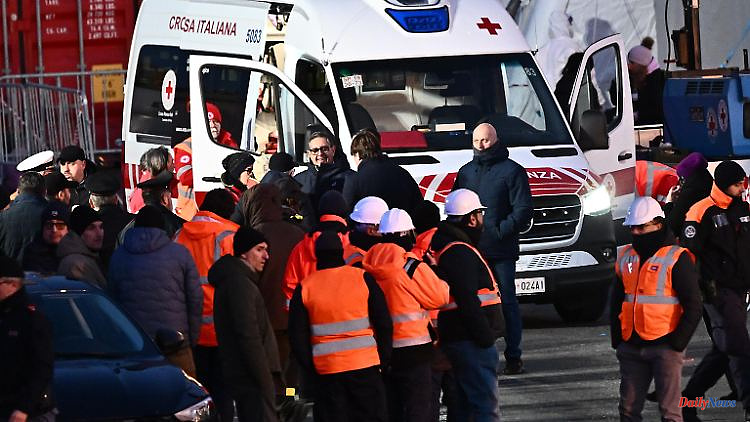The rescue ship "Geo Barents" embarrasses the Italian government. Actually, it should only have carried out one rescue operation - but it took in shipwrecked people from three boats.
Saturday afternoon, just after 3 p.m. in the port of La Spezia. After a five-day journey, the rescue ship "Geo Barents" of the aid organization Doctors Without Borders arrives in the Ligurian port. It has 237 migrants on board, including 87 minors. There is also an 11-month-old baby with a 17-year-old mother. Along the jetty you can see the white tents in which the migrants are to be medically examined and their personal data recorded. The controls are lengthy, which is why not all migrants can disembark on Saturday. 90 have to wait until Sunday morning.
Along with the port of Ravenna, La Spezia is the northernmost port to which a private rescue ship has been sent so far. It is 1,500 kilometers away from the first rescue site in international waters off the Libyan coast. Journalists are only allowed to follow the landing operation from a distance, from a terrace above the jetty. Officially, because normal port work, i.e. unloading of containers, continues.
When the prefect of the province of La Spezia, Maria Luisa Inversini, comes, she is assailed by the journalists: What will become of the "Geo Barents" now? If it is confiscated, will Doctors Without Borders face criminal proceedings or a fine? The thing is as follows: a decree recently announced by Interior Minister Matteo Piantedosi strictly stipulates that private rescue ships must call at the port designated by the authorities immediately after the first rescue operation, without carrying out any further rescue operations.
However, the "Geo Barents" has carried out three rescue operations. On January 24th the first. She reported this to the responsible Italian authorities and was then ordered to bring the migrants to La Spezia. The ship was heading north, but on January 25 at 06:51 in the morning it received a second SOS from other shipwrecked people who were near the Libyan port of Zuwara. The third rescue operation took place in the afternoon, during which the 11-month-old baby and her mother were also taken in. "And if we hadn't rescued them from the old dinghy with the others, they would all have died," says a MSF representative. After this rescue operation, the "Geo Barents" resumed course towards La Spezia.
The questions visibly embarrassed the prefect. "We are dealing with a new situation here and it will take time to clarify the situation." She cites technical investigations that need to be done without going into more detail. "Because it's not enough for the Geo Barents to say they've done three rescues," she adds. When asked what her personal attitude is, she replies: "I am a civil servant and I apply the law. However, I would like to add that I have been dealing with international protection for nine years and I assure you that everyone's rights will be protected ."
The city of La Spezia is governed by a centre-right coalition. Mayor Pierluigi Peracchini, who also comes to the terrace, has no doubts. He tells the journalists: "The Italian law must not be disregarded. First the ship went in one direction, then south again, as if the law didn't exist." However, he also points out that it is not up to the city administration to take any steps in this regard.
When asked what now has priority, Italian law or international maritime law, neither the mayor nor the prefect wanted to comment. In this case, however, that is the real point - which is clear to lawyers: "International maritime law takes precedence," says Vitalba Azzollini, an expert on international maritime law. "But I can understand that the prefect cannot comment on this. In her function, she is only an extension of the Ministry of the Interior and has to follow its instructions."
But what happens to the "Geo Barents" now? "I hardly think that the Italian government can have any interest in starting a scandal that could ultimately lead to the European Court of Justice and the Human Rights Court," notes the lawyer.
The fact that it could come to this is due to the Piantedose Decree, the provisions of which are more than questionable, although they refer to international maritime law. It stipulates that after the first rescue operation, a ship must call at the safe port designated by the authorities as quickly as possible and without changing route. "That's theoretically correct," says Vitalba Azzollini. At the same time, however, the decree violates international regulations, which provide for the saving of human life as the most important rule in force. "A commander who doesn't follow these rules is liable to prosecution," she emphasizes. "And since the ship is currently considered a safe place for those already rescued, in the event of a second SOS, the captain must also save the other shipwrecked."
The international law of the sea also stipulates that coastal states must relieve the ship's commander of his responsibility for the shipwrecked as quickly as possible. "But if you assign a rescue ship to a port that is 1,500 kilometers away from the rescue site, there is a contradiction," says the lawyer.
The organization Doctors Without Borders is keeping a low profile. When asked by ntv.de what is happening with the "Geo Barents", the answer is: "We have not received any notification at the moment. We are waiting."
A scandal would indeed be inconvenient for the right-wing government in Rome. A special EU summit will take place on February 9th and 10th, which will also deal with the issue of migration and securing the European borders. A few days earlier, on Friday, Chancellor Olaf Scholz will receive Italian Prime Minister Giorgia Meloni in Berlin. Italy does not want to act as a crosshead again, but prefers to present results. For example, the agreement signed by Meloni in Tripoli on Saturday to deliver five more Italian patrol boats to the local coast guard. An approach that should also be in the interests of the other populist EU governments.












